Sonderweg oder Anderweg? -- An interactive AAR in the Hohenzollerns megacampaign
- Thread starter Avindian
- Start date
-
We have updated our Community Code of Conduct. Please read through the new rules for the forum that are an integral part of Paradox Interactive’s User Agreement.
You are using an out of date browser. It may not display this or other websites correctly.
You should upgrade or use an alternative browser.
You should upgrade or use an alternative browser.
I am all for the Reichstag's continued death spiral into irrelevance, constantly raising the same issues over and over again. Perhaps then Germany will realize her true future is under a proletarian government that genuinely cares about the working class instead of pretending to for the votes. I vote No.
Hermann von Leute
Hermann von Leute
I am all for the Reichstag's continued death spiral into irrelevance, constantly raising the same issues over and over again. Perhaps then Germany will realize her true future is under a proletarian government that genuinely cares about the working class instead of pretending to for the votes. I vote No.
Hermann von Leute
The same proletarian party that is constantly proposing the same laws?
The same proletarian party that is constantly proposing the same laws?
Did the word "party" appear in my speech, Comrade Meningen? Surely you know that the ideal communist state is partyless and classless.
The same proletarian party that is constantly proposing the same laws?
I would like to note that Comrade Liebknecht was simply doing what he thought was right, and has retired from politics. The KPD is under new leadership.
And this law will not prevent people from proposing rejected laws; it just simply makes it instead of one year, four. It solves nothing.
von Altmark never bothers to show up to voting since his vote doesn't matter anyways.
Voting is now closed. The new Redundancy Act passes, 476 votes to 12 in the Assembly, 49 votes to 32 in the Conclave. Once the President and Chancellor have signed the law, we will close the Reichstag's business for another year. ((@TheChalk and @Jack LEagle, respectively.))
Chief Justice of the Supreme Court
Chief Justice of the Supreme Court
Thank you, Herren. The Reichstag's business is now closed.
Chief Justice of the Supreme Court
((While I've still got some energy left, I'll play and update tonight! ))
))
Chief Justice of the Supreme Court
((While I've still got some energy left, I'll play and update tonight!
1892: A German resurgence
With the rebellion over, Germany caught its breath. An emergency session of the Reichstag agreed to give President Samuel von Dwyfor-Frauenkirche an additional year before holding elections, so that stability would prevail. [1] And it did. 1892 was a banner year for Germany, particularly in the economy. Approximately 15% of even the poorest Germans claimed access to luxury goods, something unheard of just ten years before. By the end of 1892, that percentage had dropped slightly, as global events shifted the supply of those same goods, but ultimately it was all for the best, and the German treasury had never been fuller.


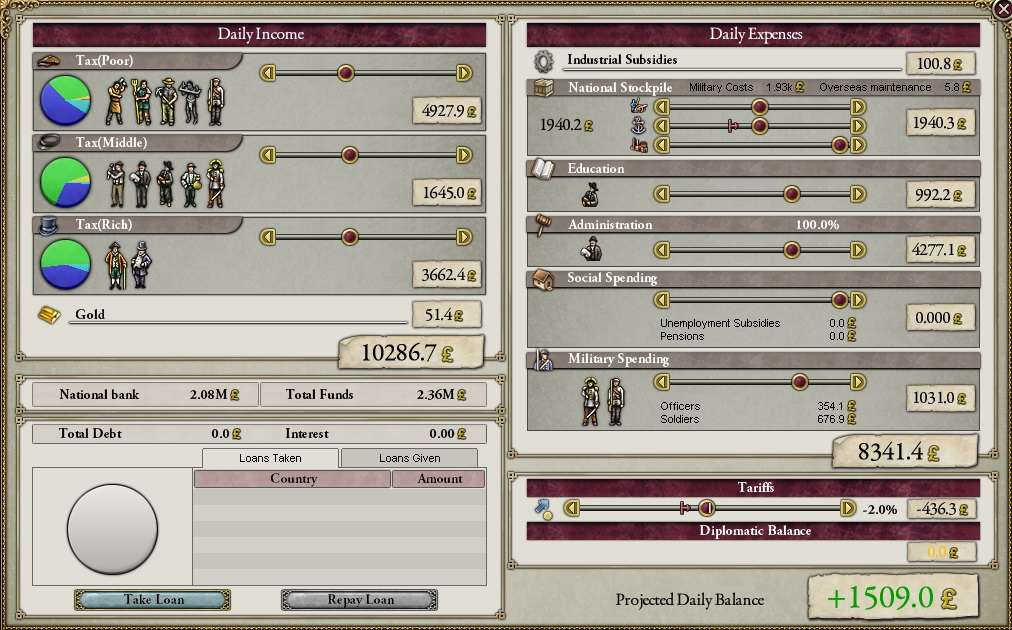
The unexpected resignation of Minister of the Interior Franz von Bavel-Timmermans and promotion of former Commander of the Gendarmerie Otto Kant signaled a shakeup at the Ministry of the Interior. Communists and Socialists were steadily purged from the ministry's ranks, but at the same time, Kant's ministry was one of the quietest in recent history. Kant never appointed a successor as Commander of the Gendarmerie, and the Gendarmerie themselves grew more lackadaisical. When a group of Germans interested in establishing more open and inclusive labor unions in Gottingen did just that, the local Gendarmerie did nothing, with some unit commanders even joining the union. It was a signal to the rest of Germany that the formerly repressive Ministry was kinder and gentler. Kolmar welcomed the new regime, in particular, enthusiastically proclaiming their eternal allegiance to the central government in Nürnberg.
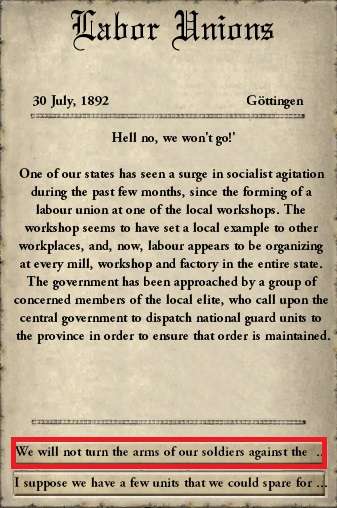
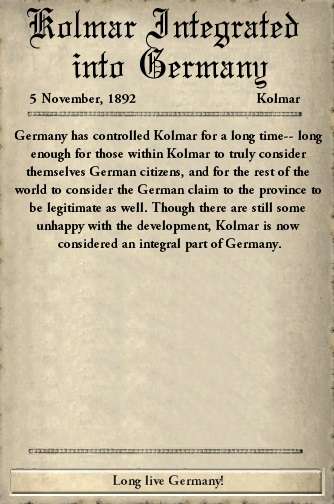
Germans watched with detached interest as the world around them began to shift as well. Despite the Italian Parliament's decision to grant autonomy to those Italians who favored the Pope to the Head of the House of Hohenzollern, the people of Rome and nearby Viterbo, eager for an accommodation with the progressive Italy set up in Germany, rose up and threw out the Pope. They nationalized all of the Papal lands and eagerly welcomed President Karl Adimari as he greeted the new nation with enthusiasm. Very preliminary talks began regarding the integration of the new Italy under German control, but the Italians, armed with British support, demanded a much looser arrangement than even Franz Meningen would accept: a totally independent, but friendly, Italy, centered on Rome, that would conduct its own foreign policy, hold its own army, and coin its own currency. This new Italy would accept the Hohenzollern family as the head of their church, agree to economic accords, and sign a pact of military alliance with Germany in exchange.

In Syria and Grenada, however, the idea of German domination was less and less appealing. The old government of Grenada was overthrown, replaced with a plutocratic republic that dominated the city of Lisbon. Syrians began to hear talk of a Jewish homeland within their borders, talk they did not entirely appreciate given their alliance with Germany. NIzhny Novgorod, on the other hand, welcomed German acknowledgement of their independent and used their offices to help relieve some of the tensions between Germany and Poland.
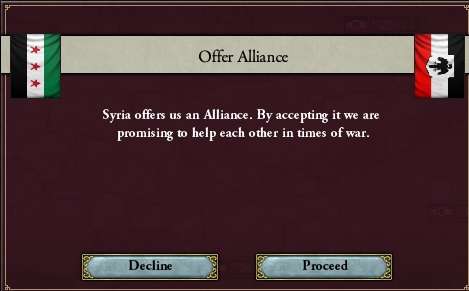
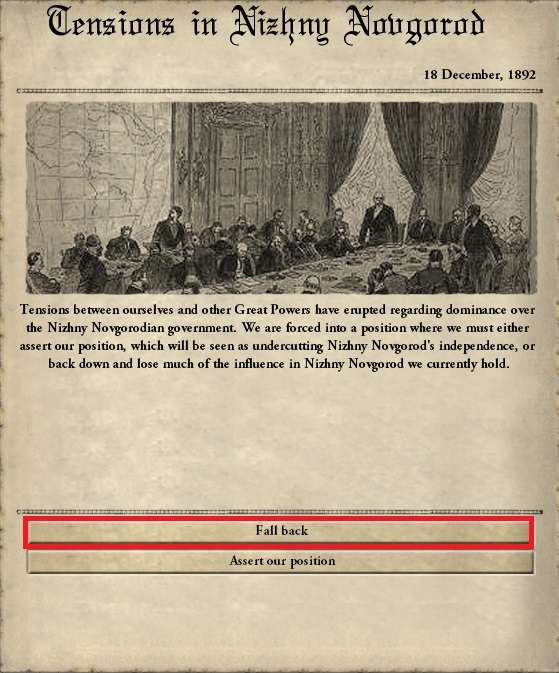
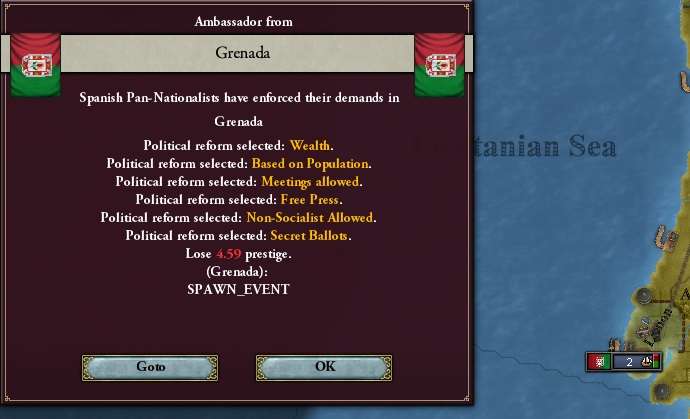
The only slightly worrying spot in German politics was a quiet initiative to restore the honor and pride of the German army. Minister of Finance Friedrich Thiessen announced that, in time of future crisis, he would fund the army entirely, even if it meant raising taxes. The Ministry of War and Ministry of Education announced expansions to Germany's war colleges and academies, including courses on managing risk and the problems of logistics. Efficient management was the order of the day for the German military.
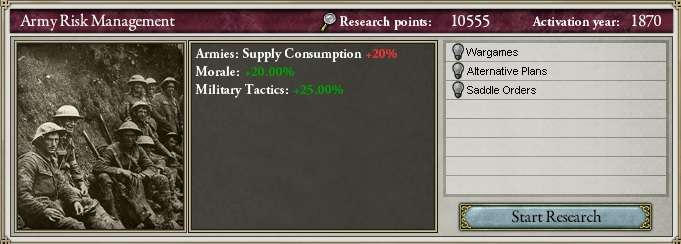
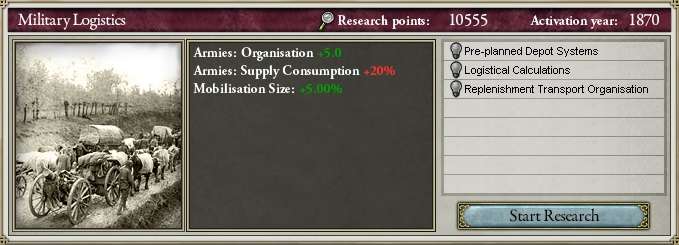
--------------------------------------------------------------------------------------------------------------------------------------------
[1] Retconning for bad math. The Supreme Court announces new elections for the office of President. Given the emergency nature of 1891, Herr von Dwyfor-Frauenkirche is eligible to run as President again for a full four year term. The Supreme Court invites all eligible individuals who wish to run for office to do so, remember the restriction of two individuals per party. ((I'm ending the practice of "automatic nominations" as a way to reduce my workload in building the spreadsheet.
The Foreign Ministry reports that a delegation from the newly independent nation of Italy would like to enter into talks with Germany for a closer relationship. ((I will roleplay as the Italian delegation.)) The German delegation would include the newly elected President as head of state, the Foreign Minister, and President of German Italy Karl Adimari, at the Italian delegation's request. Any other individuals may be added as it seems fit.
Finally, the Supreme Court finds that Minister of the Interior Otto Kant has been derelict in his duties, failing to appoint a Commander of the Gendarmerie as per his constitutionally mandated requirements. The Supreme Court requests that the Chancellor contact the Minister and either convince him to accept his obligations or to replace him as an inactive member of the government. ((Guys, please don't appoint people unless you ask them first.))
Nominations will be accepted for 48 hours. All candidates must announce they are running, or they may be nominated by a third party, by Tuesday at 10 PM (-6 GMT).
Chief Justice of the Supreme Court
- 1
Well it looks like we no longer need the Italian Parliament since the Italians have apparently unified. Who knew that Italy only included Rome and the former Papal State.
In all seriousness though, the fact that this so-called Italy in Rome claims to have unified Italy makes me worry that they may at some point wish for the rest of the region to join them. While I have no problem with the people of Rome deciding to topple the Pope, claiming that they have unified Italy when Germany holds most of the region is a clear attack on our right to rule over the region. I recommend we keep a close eye on them for now. I fear that if negotiations fail, they will resort to violence or even revolution to bring all of Italy under their rule, regardless of what Germany wants.
- Eva von Vandenburg
In all seriousness though, the fact that this so-called Italy in Rome claims to have unified Italy makes me worry that they may at some point wish for the rest of the region to join them. While I have no problem with the people of Rome deciding to topple the Pope, claiming that they have unified Italy when Germany holds most of the region is a clear attack on our right to rule over the region. I recommend we keep a close eye on them for now. I fear that if negotiations fail, they will resort to violence or even revolution to bring all of Italy under their rule, regardless of what Germany wants.
- Eva von Vandenburg
((I have to ask Avidian, was this a planned event, or one that happens naturally IG?))
A backbencher makes his opinion very clear : Let Italy go ! Let us remove these criminals from the GERMAN state !
I am quite glad to see that the people of Rome are willing to join our most esteemed Republic. However, I do not believe that granting almost complete independence to Italy would be wise. We must continue to negotiate with the people of Rome to come to an amicable solution.
The recent economic boom is indisputable proof that Liberal economics work and can provide prosperity to all classes. Who needs socialism when the lower classes can buy luxury goods!
-Herr Liberator
((btw shouldn't it be time for an Italian presidential election?))
The recent economic boom is indisputable proof that Liberal economics work and can provide prosperity to all classes. Who needs socialism when the lower classes can buy luxury goods!
-Herr Liberator
((btw shouldn't it be time for an Italian presidential election?))
Last edited:
Will there be elections for the President of Italy? I have the utmost respect for Comrade President Adimari, but I seek to at least make known that the Communist Party shall run for public offices, and will not be deterred by those who wish to see us ground out into the fine dust of history.
The government in Rome is... peculiar, to say the least. I must stand opposed to an independent Italy; particularly one that takes orders from Edinburgh and London; it is unacceptable. Speaking for the people of Turin, they are happy with German rule, and have no major grievances that wouldn't exist even under rule from Rome.
I applaud Signore Meiningen and the government for their cautious diplomacy. I offer my services as a diplomat if need be.
- Rafanelli
The government in Rome is... peculiar, to say the least. I must stand opposed to an independent Italy; particularly one that takes orders from Edinburgh and London; it is unacceptable. Speaking for the people of Turin, they are happy with German rule, and have no major grievances that wouldn't exist even under rule from Rome.
I applaud Signore Meiningen and the government for their cautious diplomacy. I offer my services as a diplomat if need be.
- Rafanelli
Last edited:

